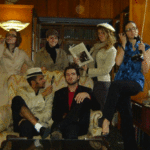 HISP 318: The Literary Identities of Latin America
HISP 318: The Literary Identities of Latin America
Through a close reading of major authors, and themes of Spanish American Literature from the Early Modern Period to the present, this course seeks answers to the open question of what is a Latin American Literary Identity. Students are expected to engage in close reading and discussion of texts, as well as to revise their papers. The course is conducted in Spanish and all reading and writing for the course is also done in Spanish.
 HISP 320: Spanish Women in the Golden Age(cross-listed with WGS 325)
HISP 320: Spanish Women in the Golden Age(cross-listed with WGS 325)
The history of women in Golden Age Spain is a largely untapped field. In early modern Spain, church and state, helped by the powerful Inquisition, promptly extended their dominance from the control of basic expression of faith to the domain of daily life, of personal privacy, and inside this sphere, sexual behaviors. Women were not spared in this general domestication of minds and bodies. On the contrary, in this patriarchal and catholic society all eyes were focused on their writings, talk, body and its image, sexuality, and faith, even their dreams and visions.
In this course we will examine the position of women in religious, political, literary, and economic life. Drawing on both historical and literary approaches we will challenge the portrait of Spanish women as passive and marginalized, showing that despite forces working to exclude them, women in Golden Age Spain influenced religious life and politics and made vital contributions to economic and cultural life.

This infused course examines how the fluidity of individual identity in early modern Spain destabilized a national identity based on exclusion and difference. Students will reflect upon questions such as: What is madness? What is identity? How are identity categories depicted in Don Quixote’s world? This course will be taught every two years.

This course will provide a framework to study the historical and theoretical foundations of queer theory and queer activism. We will explore how queer theory problematizes stable identities in Latin American, Latin@ and Iberian cultures.

This course studies seminal narratives from Latin America; it is aimed at developing critical and evaluative reading of Latin American major literary works among students through rigorous close reading and analysis. The thematic structure of the course is based on the idea that from fictional texts we can derive knowledge that help us to understand the historical roots of today’s Latin American society and culture.Taught in Spanish.

This course introduces students to the study of Early Modern Spanish texts focused on explorations of New World nature and landscapes. The goal of this course is to better understand how these Early Modern texts intersect with natives culture(s) and provide a perception of nature as both a physical and cultural entity. Close readings of texts will improve students’ ability to understand primary sources, while digital resources and tools (text encoding, mapping, virtual reality) will provide a Digital Humanities scholarly approach. Taught in Spanish.

This course will introduce students to the methods and tools of Digital Humanities to explore new ways of reading literature, analyzing images, and assessing audio-visual artifacts. The goal of the course is to provide students with a space to use digital tools to create projects (such as story-telling, electronic literature, video, art) and also to develop critical vocabularies for analyzing digital projects. Without sacrificing critical discourse, this projects-based class allows students to see how digital tools may be applied to humanities fields and possibilities for scholarly work, particularly interdisciplinary work. No technological expertise is required, and students will be encouraged to experiment and tinker with a variety of platforms. This course is conducted in English.

This class focuses on hard-boiled detective novels from Spain, Argentina, Cuba, and Mexico. Although this genre has been considered “minor” and “trashy,” in the Hispanic world has served to present and to criticize contemporary political or social situations. Detective novels are privileged cultural products to study both high and low culture and the intersection of class, race, and gender. Additionally, these novels and their protagonist serve as a record of the quotidian culture of cities like Barcelona, Buenos Aires, La Habana, and México D.F. during the last three decades of the twentieth century.

This course introduces the students to the study of narrative written by contemporary Spanish women authors from the end of the Civil War (1939) to the present. We will approach the texts from a dual perspective. On the one hand, we will analyze the works in their socio-political and cultural context. On the other hand, we will study the works at the textual level, i.e., analyzing the text itself, its trends and its main elements: plot, themes, characters, techniques, narrative voices and the reader’s role in the work.
